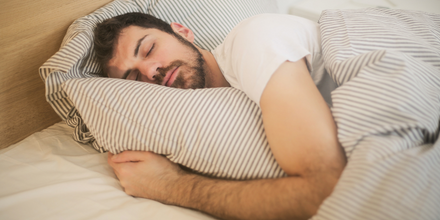According to the National Heart, Lung and Blood Institute (NHLBI), 50-70 million Americans have sleep disorders and one in three adults don’t get the recommended sleep they need.
Take a minute to think about your sleep. Do you feel rested? Do you have uninterrupted sleep each night?
Sleep is a basic need, just like eating and drinking. It should not be negotiable as it’s critical to your overall health. It’s important for performing well during the day at work or school, fighting off infection, restoring energy, processing new information, and preventing chronic diseases. An increased risk of obesity, diabetes, and heart disease has been repeatedly linked to inadequate sleep over time.
How Much Sleep Do You Need?
The National Sleep Foundation says that adults ages 18-64 need seven to nine hours of sleep per night. Those ages 65 and up need seven to eight hours. We know younger children need more. Kids ages 14-17 need eight to 10 hours and those ages 6-13 need nine to 11 hours.
Add up your hours of sleep each night. Many Americans fall short. Take steps to increase this number by going to bed about 30 minutes earlier each night until you meet your goal.
How to Ensure a Good Night’s Rest
- Control the environment. Make sure your bedroom is quiet and dark and has an appropriate temperature.
- Put your phone, TV, and other tempting electronics out of reach. Limit screen time before bed. The bright light from your phone can stimulate your brain and make sleep more difficult.
- Watch what you eat. Don’t have a large meal, excess caffeine or alcohol before bed. Some people find it better to have an afternoon cutoff time for caffeine.
- Follow the same routine. Go to bed and get up at the same time during the week. This includes the weekend as well!
- Stay active. Finding time to exercise each day can promote better sleep at night.
How about a Nap?
Some people rely on naps to meet their sleep goals. Is it a good idea?
Consider napping if you feel sleepy or are preparing for sleep loss (like a night shift schedule). Napping can help with relaxation, reducing fatigue, and improving performance. It shouldn’t affect your regular bedtime. The best way to do this is to make sure your naps are short and in the early afternoon. Napping late in the day and for long periods can affect your evening sleep. Keep naps short, around 10-20 minutes.
Sleep Aids
If sleep continues to be difficult, see a physician to discuss possible sleep medication or other treatment. There are natural supplements that can improve sleep.
- Melatonin – This supplement helps regulate your circadian rhythm. Your melatonin level is highest right before you go to sleep. Supplementing can reduce the time it takes to go to sleep and increase sleepiness.
- Valerian root – This herbal supplement is shown to improve sleep quality and sleep disorder symptoms. There are mixed reviews on this supplement’s effectiveness, but it remains one of the more popular sleep supplements.
Ready, set, sleep! Get some rest and reap the benefits.
For more blog posts on sleep and health, see below.






